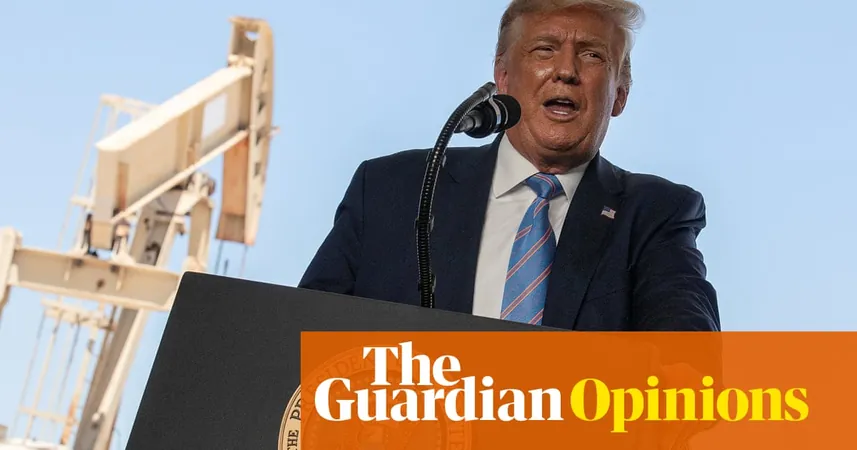
The Precarious Reality of Trump’s International Aspirations: A National Security Nightmare?
2025-01-13
Author: Ken Lee
Donald Trump hasn’t even stepped back into the office, yet his controversial proposals are sending shockwaves through the pillars of United States national security. His approach, laden with unpredictability, has raised concerns about the U.S. becoming an unreliable partner on the global stage. Trump shows a blatant disregard for historical alliances and the established international rules that have governed global affairs since World War II—rules designed to avert the disastrous fallout of great power conflicts.
From aiming to rename the Gulf of Mexico the “Gulf of America” to expressing interest in acquiring territories like the Panama Canal and Greenland, Trump’s antics paint a bizarre picture of his foreign policy vision. His cavalier attitude towards the sovereignty of nations, including two NATO allies, severely undermines American credibility in the face of aggressive actions by players like Russia and China. Trump’s embrace of a misguided vision of Manifest Destiny feeds into his isolationist tendencies and amplifies his unpredictability—a stark contrast to the constructive role the U.S. once played on the world stage.
Many speculate that Trump's outlandish claims serve as distractions from his broken promises concerning economic issues, particularly inflation—an essential topic that resonated during his campaign. Trump had assured Americans that “inflation will vanish completely” and presented a bold agenda to reduce prices. However, his admission that “it’s hard to bring things down once they’re up” highlights the gap between his campaign rhetoric and the economic realities faced by everyday citizens.
Amidst this chaos, Trump’s fixation on Greenland has taken center stage as he frames it as a “national security” issue. In historical context, the U.S. has maintained operational bases in Greenland since 1951, cooperating closely with NATO allies without any financial liabilities. Yet, Trump’s fixation raises questions about the strategic significance he assigns to regions like Greenland, seemingly echoing a “madman” theory of negotiation akin to strategies employed by past leaders.
Moreover, there is an underlying absurdity in Trump’s desire to redraw national boundaries, a notion that doesn't hold up against political realities. For instance, the possibility of Canada becoming the "51st state" would require a complete dissolution of its federal government—a move that seems improbable at best. This could also provoke a constitutional crisis, challenging the foundational principles of American democracy and complicating significant domestic policies, such as healthcare reforms, which could pivot towards a Canadian-style model as proposed by some.
Despite Trump’s popularity among a segment of the American populace, the overwhelming sentiment in Canada appears starkly opposing. Polls indicate that a staggering majority would not welcome Trump’s America, showcasing his status as one of the least favorable public figures in Canadian sentiment. Worryingly, Trump’s potential policy maneuvers could deepen the ongoing political polarizations between the two nations.
If we entertain the scenario where Trump contemplates annexing Greenland, questions arise regarding its status as a state and its potential impact on U.S. political dynamics. With a population of about 56,000, it raises critical questions about political representation—especially considering disparities in populations in states like Wyoming.
Interestingly, Greenland’s Prime Minister Mute Egede has adopted a contrasting tone to Trump, projecting a statesmanlike approach aimed at cooperation with the U.S. and other NATO partners, even as Trump pushes his controversial agenda. Egede’s government recently expressed a desire to collaborate with the incoming administration to ensure stability in the Arctic region, amplifying the discrepancies between realistic diplomatic engagements and Trump's bombastic proclamations.
Ultimately, Trump’s entertaining yet alarming escapades mirror the somewhat farcical narrative of classic satirical films, illustrating the dangers of theatrical politics. His administration’s proposals could lead not only to serious diplomatic rifts but also risk undermining the foundational principles of security, democracy, and international cooperation that the U.S. has long championed.
As Trump continues to blur the lines of political discourse with fantasy and spectacle, the world watches with bated breath—wondering where his whims might lead us next. Can the fabric of international relations withstand the folly of his “big dreams”? Or are we inching closer to a geopolitical crisis of historic proportions? The answer remains uncertain, raising the stakes for international diplomacy in the years to come.


 Brasil (PT)
Brasil (PT)
 Canada (EN)
Canada (EN)
 Chile (ES)
Chile (ES)
 Česko (CS)
Česko (CS)
 대한민국 (KO)
대한민국 (KO)
 España (ES)
España (ES)
 France (FR)
France (FR)
 Hong Kong (EN)
Hong Kong (EN)
 Italia (IT)
Italia (IT)
 日本 (JA)
日本 (JA)
 Magyarország (HU)
Magyarország (HU)
 Norge (NO)
Norge (NO)
 Polska (PL)
Polska (PL)
 Schweiz (DE)
Schweiz (DE)
 Singapore (EN)
Singapore (EN)
 Sverige (SV)
Sverige (SV)
 Suomi (FI)
Suomi (FI)
 Türkiye (TR)
Türkiye (TR)
 الإمارات العربية المتحدة (AR)
الإمارات العربية المتحدة (AR)